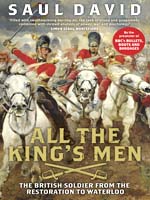Book Review: All the King’s Men
Matthew Sturgis reviews the first part of an ambitious history of the British army


Military/history All The King's Men Saul David (Viking, £25, *£20)
Saul David will be known to readers as the dashing presenter of the BBC4 series on military logistics, Bullets, Boots and Bandages. The intelligence and enthusiasm he brings to the television screen are equally present in his latest book, the first volume of an ambitious two-part history of the British army. All armies to some extent reflect national character.
The tale Prof David tells is as much a study of the evolution of British society and politics as it is of the military. It is an extraordinary story, packed with drama, incident and great characters. Inevitably, the towering figures of Marl-borough and Wellington dominate, but almost equal billing is given to the lanky, hard-headed prodigy James Wolfe, whose early death at Quebec left the question of whether he might have become the third statue in the pantheon of British military greats of the period forever unanswered.
There are many other lesser, but equally fascinating characters, such as Col Percy Kirke, the garrison commander at Tangier. In 1683, he was visited by Samuel Pepys, who denounced his louche lifestyle: ‘To show how little [he] makes of drunkeness,' he wrote, ‘I have seen, as he has been walking with me in the street, a soldier reel on him as drunk as a dog. He hath only laughed at him and cried "The fellow hath got a good morning's draft already!".' Pepys was hardly one to talk, and Kirke's foibles did not prevent him from lifting the siege of Londonderry a few years later.
The army was where the base and apex of British society came together. Those with commissions were often drawn from the highest rank. The men were the poor and the desperate. Having purchased their commissions, many officers felt they had no further need to exert themselves. The common soldier had a status little higher than that of a slave, subject to dreadful punishments, meagre wages, enduring danger and hardship only to be discarded when no longer able to fight. One of the most poignant passages tells the fate of Private Thomas Pococke, who, having survived the Peninsular Campaign and Waterloo, was discharged to scrape a living as a road mender and end his days as a pauper.
Yet, as the author shows, high and low shared an esprit and fighting prowess without which ‘Britain could not have become, by 1815, the paramount imperial and industrial power in the world'. Prof David combines a clear and powerful narrative with shrewd judgements, illuminating vignettes and fresh and telling detail. The great battles are deftly described and he is excellent on logistics, tactics and technological developments. All The King's Men is all you could hope for in a study of the army at this time. Quite an achievement.
- Subscribe to Country Life and save over £50 a year
Sign up for the Country Life Newsletter
Exquisite houses, the beauty of Nature, and how to get the most from your life, straight to your inbox.
Country Life is unlike any other magazine: the only glossy weekly on the newsstand and the only magazine that has been guest-edited by HRH The King not once, but twice. It is a celebration of modern rural life and all its diverse joys and pleasures — that was first published in Queen Victoria's Diamond Jubilee year. Our eclectic mixture of witty and informative content — from the most up-to-date property news and commentary and a coveted glimpse inside some of the UK's best houses and gardens, to gardening, the arts and interior design, written by experts in their field — still cannot be found in print or online, anywhere else.
-
 Athena: We need to get serious about saving our museums
Athena: We need to get serious about saving our museumsThe government announced that museums ‘can now apply for £20 million of funding to invest in their future’ last week. But will this be enough?
By Country Life
-
 Six rural properties with space, charm and endless views, as seen in Country Life
Six rural properties with space, charm and endless views, as seen in Country LifeWe take a look at some of the best houses to come to the market via Country Life in the past week.
By Toby Keel